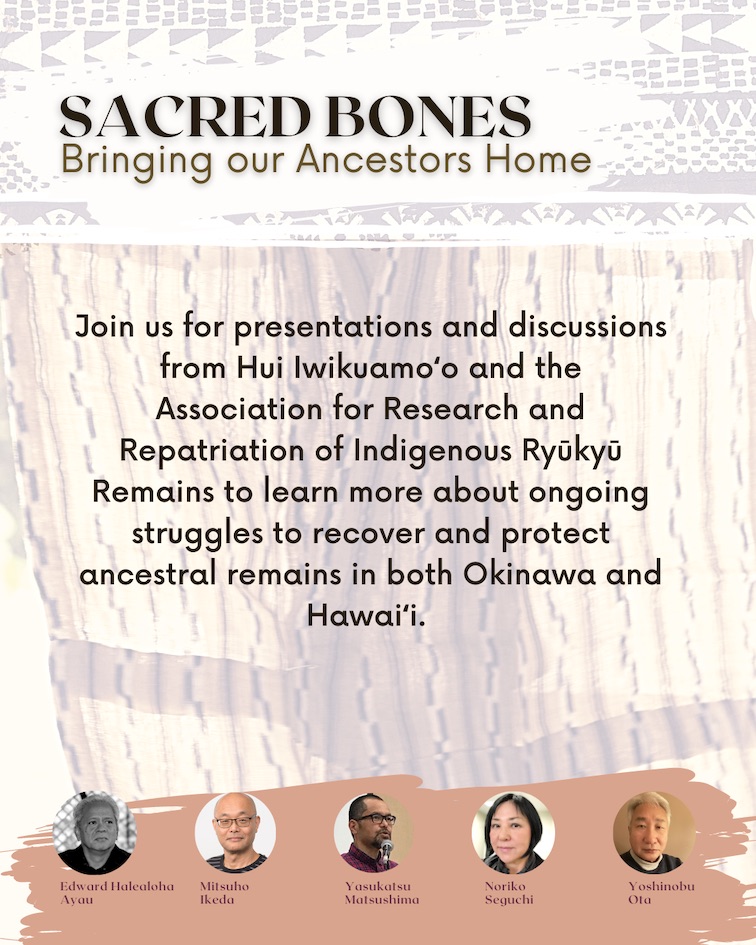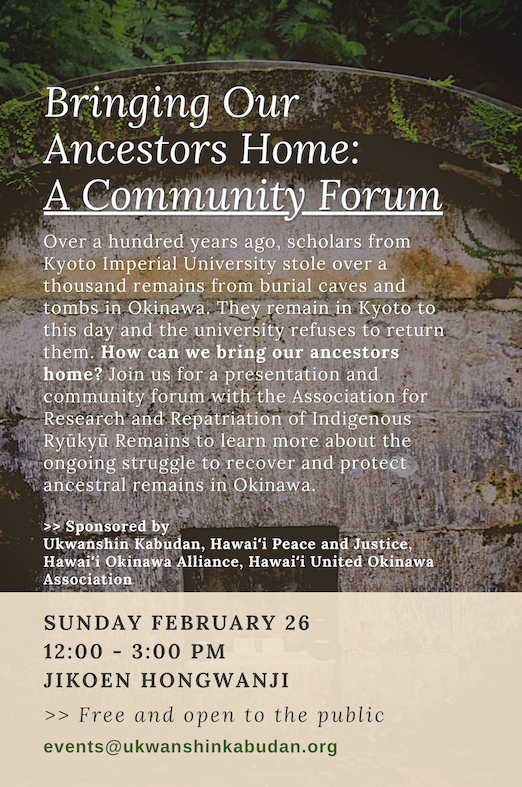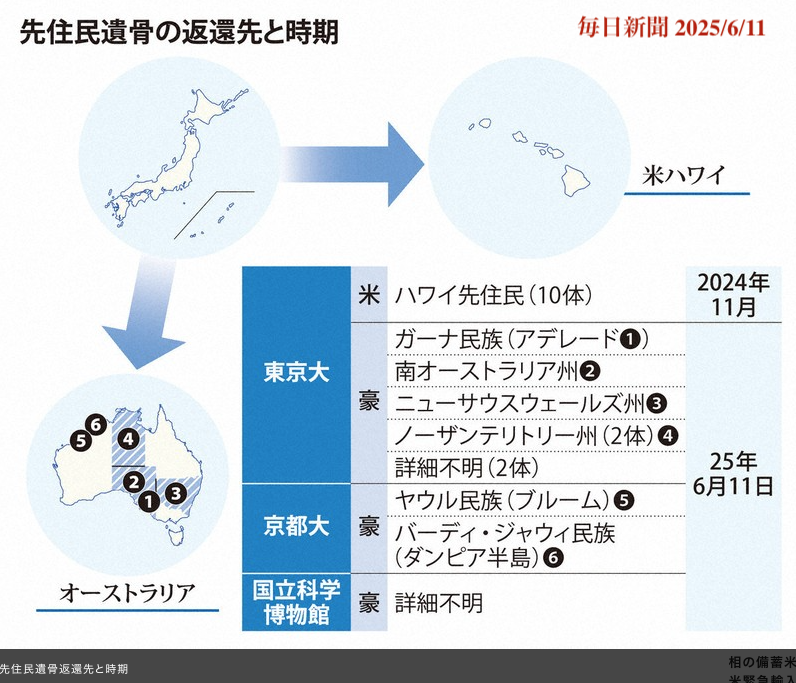★エドワード・ハレアロハ・アヤウ氏(博士)は、56歳の父親で、4人の娘と1人の息子を持
つハワイ
人(Ōiwi)である。過去30年間、Hui Mālama I Nā Kūpuna O Hawai'i
Nei(ハワイの祖先を慈しむ会)の事務局長として、イウィ・クプナ(ハワイに伝わる骨格)、モエプ(葬具)、メアカプ(神具)の返還運動を主導してきま
した。ヒロの伝統文化実践者エドワードとプアラニ・カナヘレによって設立され、世界中の博物館から6000体以上の遺骨や遺品を送還・再埋葬し、2015
年に正式に解散しました。現在もハワイ州事務局のボランティアとして国際的な送還に取り組んでおられます。
| Mr. Edward
Halealoha Ayau is ‘Ōiwi (Hawaiian), a 56-year- old father of four
daughters and a son. For the last 30 years, he has led efforts to
repatriate iwi kūpuna (ancestral Hawaiian skeletal remains), moepū
(funerary possessions) and mea kapu (sacred objects) as the Executive
Director of Hui Mālama I Nā Kūpuna O Hawai‘i Nei (Group Caring for the
Ancestors of Hawai‘i). Founded by traditional cultural practitioners
Edward and Pualani Kanahele of Hilo, they repatriated and reburied over
6,000 remains and items from museums around the world, before formally
dissolving in 2015. He continues to work on international repatriation
as a volunteer for the Office of Hawaiian Affairs. https://thefunambulist.net/network/edward-halealoha-ayau |
エドワード・ハレアロハ・アヤウ氏は、
56歳の父親で、4人の娘と1人
の息子を持つハワイ人(Ōiwi)である。過去30年間、Hui Mālama I Nā Kūpuna O Hawai'i
Nei(ハワイの祖先を慈しむ会)の事務局長として、イウィ・クプナ(ハワイに伝わる骨格)、モエプ(葬具)、メアカプ(神具)の返還運動を主導してきま
した。ヒロの伝統文化実践者エドワードとプアラニ・カナヘレによって設立され、世界中の博物館から6000体以上の遺骨や遺品を送還・再埋葬し、2015
年に正式に解散しました。現在もハワイ州事務局のボランティアとして国際的な送還に取り組んでおられます。 |
| EDWARD
HALEALOHA AYAU /// REPARATIONS: 30 YEARS OF REPATRIATION OF HAWAIIAN
ANCESTORS |
ポッドキャストによる解説 |
OHA: Edward Halealoha Ayau On Mauna Kea Access Road (Sept. 19, 2019) |
|
| 返還における儀礼の様子 本国送還式: ゲッティンゲン大学が「イウィ クプナ」をハワイの子孫に引き渡す |
2022 年 2 月 9
日水曜日、13 体のイウィ クプナ (ハワイ先祖代々の遺骨) がハワイから子孫に返還された。 このセレモニーイベントの録画記録(YouTube) |
| Yale
students
from Hawaii bring iwi kupuna, or human remains, back to the Islands -
After more than a century away from their resting place -- iwi kupuna,
or human remains, have been laid to rest back here in Hawai'i. Ancestral remains in Peabody Collection repatriated to Hawaii, reported by "Yale News" MAGGIE GRETHER 2:57 AM, OCT 18, 2022. |
|
| University of
California, Berkeley repatriates cultural artifacts to Indigenous tribe The studying and exhibiting of human remains and sacred objects taken from Native American graves and sites have been a source of bitter relations between many cultural institutions and Indigenous tribes. After facing criticism, the University of California, Berkeley is working to repatriate many of those artifacts. Jeffrey Brown reports for our arts and culture series, "CANVAS." Stream your PBS favorites with the PBS app: https://to.pbs.org/2Jb8twG Find more from PBS NewsHour at https://www.pbs.org/newshour Subscribe to our YouTube channel: https://bit.ly/2HfsCD6 Follow us: TikTok: https://www.tiktok.com/@pbsnews Twitter: http://www.twitter.com/newshour Instagram: http://www.instagram.com/newshour Facebook: http://www.pbs.org/newshour |
|
| Why Native
Americans are buying back land that was stolen from them - From 1877 to 1934, under a range of laws and reneged-upon treaties, the U.S. government appropriated tens of millions of acres of Native American land. In recent years there has been a growing movement known as “land back” to reclaim their lands. In some cases that has meant tribes are choosing to buy it back on the open market. In the first of a two-part series, special correspondent Kira Kay reports from Northern California. Stream your PBS favorites with the PBS app: https://to.pbs.org/2Jb8twG Find more from PBS NewsHour at https://www.pbs.org/newshour Subscribe to our YouTube channel: https://bit.ly/2HfsCD6 Follow us: Facebook: http://www.pbs.org/newshour Twitter: http://www.twitter.com/newshour Instagram: http://www.instagram.com/newshour Subscribe: PBS NewsHour podcasts: https://www.pbs.org/newshour/podcasts Newsletters: https://www.pbs.org/newshour/subscribe |
|
| HB1894
SD1 - Hawaii State Legislature. |
The
legislature finds that there has been a recent increase of interest in
traditional Native Hawaiian practices for burials amongst Native
Hawaiians and non-Native Hawaiians. The cultural significance of
iwi kupuna, or ancestral bones, is deeply rooted in Native Hawaiian
oral traditions, language, and culture. Native Hawaiian burial
traditions acknowledge the natural cycles of life and death, and kupuna
offer spiritual sustenance to present generations. Traditional
Native Hawaiian burials include the practices for treatment of human
remains, which involve reducing remains to skeletal components and
interring the iwi in a kapa or lauhala container. The legislature
finds that these traditional Native Hawaiian burials play a critical
role in Hawaiian culture and should be encouraged to promote greater
cultural preservation.... |
| Iwi
kupuna in England for over a century return to Hawaii – along with an
apology. |
HONOLULU,
Hawaii (HawaiiNewsNow) - Some 20 iwi kupuna that were housed at the
University of Cambridge have returned home to Hawaii. - Mar. 3, 2020. OHA and a group of cultural practitioners went to pick up the collection of 20 skulls in England. They have been housed at the university for over a century, according to OHA. The remains arrived in Honolulu Sunday night, and it came with a surprising apology. “To your kupuna, I say that I am sorry that your voyage home has been so long interrupted, but I hope that you may now travel back in peace,” said Stephen J. Toope, Vice-Chancellor of the University of Cambridge..... |
| Human
Remains Uncovered At A Site In Honolulu. |
Human Remains
Uncovered At A Site In Honolulu, Published: May. 3, 2007 at 10:57 PM
JST. |


2/24 Fri. Friday UHM
Symposium
Date/Time: Friday, February 24th 3:30-5:30 pm
Event Title: Sacred Bones: Bringing Our Ancestors Home
Venue: Hālau o Haumea, Kamakakūokalani Center for Hawaiian Studies
Sponsors: UH Mānoa Kamakakūokalani Center for Hawaiian Studies, UH
Mānoa Department of Ethnic Studies, Ukwanshin Kabudan, Hawaiʻi Peace
and Justice, Hawaiʻi Okinawa Alliance
Other information: Refreshments provided; Parking is available in the
Dole Street parking structure for a $7.00 flat rate.
Event Description: Over a hundred years ago, scholars from Kyoto
Imperial University stole over a thousand remains from burial caves and
tombs in Okinawa. Today these ancestors remain boxed in Kyoto
University's library and are classified as "research objects." How can
we bring these ancestors home? What can groups in Okinawa learn from
the struggles to protect iwi kūpuna in Hawaiʻi? Join us for
presentations and discussions from Hui Iwikuamoʻo and the Association
for Research and Repatriation of Indigenous Ryūkyū Remains to learn
more about ongoing struggles to recover and protect ancestral remains
in both Okinawa and Hawaiʻi.
2/26 Sun. Sunday
community meeting
Date/Time: Sunday, February 26th 12:00-3:00 pm
Event Title: Bringing Our Ancestors Home: A Community Forum
Venue: Jikoen Hongwanji
Sponsors: Ukwanshin Kabudan, Hawaiʻi Peace and Justice, Hawaiʻi Okinawa
Alliance, Hawaiʻi United Okinawa Association
Event Description: Over a hundred years ago, scholars from Kyoto
Imperial University stole over a thousand remains from burial caves and
tombs in Okinawa. They remain in Kyoto to this day and the university
refuses to return them. How can we bring our ancestors home? Join us
for a presentation and community forum with the Association for
Research and Repatriation of Indigenous Ryūkyū Remains to learn more
about the ongoing struggle to recover and protect ancestral remains in
Okinawa.
+++
★ハワイ先住民遺骨返還 東大が10体 国内大学初(沖縄タイムス 2025.03.21)
東京大学が、1900年代初頭に米ハワイから持ち出したカナカ・マオリ(先住民)の遺骨10
体を地元の支援団体の要請に応じて返還していたことが20日までに分かった。団体側によると、日本の大学がハワイ先住民の遺骨を返還するのは初めて。国内
外で進められている琉球人の遺骨返還運動への影響が注目される。
☆アヤウさん、関連記事
| 遺骨返還の東大は「最も差別的」 ハワイ先住民が耳を疑った言葉 2025年6/11(水) 16:31配信(無署名だが毎日新聞「三股智子」記者の可能性) 毎日新聞 東京大学=東京都文京区で2021年6月15日、武市公孝撮影 東京大が昨年11月、収集・保管してきた米ハワイ先住民の遺骨10体を先住民側に返還していたことが取材で判明した。遺族や地域の同意なく持ち去られた遺骨の返還交渉は、東大と先住民側で直接進められた。 【図解】日本と海外の先住民遺骨返還巡る動き 先住民側の交渉役に立ったのは、30年以上にわたり遺骨や副葬品の返還運動を続けてきたハワイ先住民の支援団体「フィ・イビ・クアモ」のエドワード・ハレアロハ・アヤウ代表。死者の尊厳に対する東大の意識の低さに驚いたという。【聞き手・三股智子】 ――交渉の経緯を教えてください。 ◆最初に、旧東京帝国大医科大(現東大医学部)の小金井良精名誉教授の日記から、東大にハワイ先住民の遺骨4体があることが分かり、返還請求をしまし た。その後、東大で遺骨の調査研究をした経験のあるハワイ大教授の協力を得て、計10体の存在が明らかになりました。再度東大に伝え、2024年11月に 返還を受けました。 ――遺骨はどのような人々のものでしたか。 ◆10体の頭骨でした。ハワイの文化では先祖に失礼に当たるため、性別や年齢などの情報は明らかにできません。今年1月に再埋葬しました。 小金井氏が関与した4体はハワイ王朝時代の土地に埋葬されていたものです。1901年、許可なく土地に入り、泥棒のように持ち出されました。科学研究の目的だったとしても、遺骨の持ち去りは当時でも非難される行為でした。 ――どのように返還されましたか。 ◆私たちが東大に先祖を迎えに行きました。返還式典はなく、私たち自身で先祖を連れて帰るための伝統儀式を行いました。 驚いたのは、遺骨の不適切な収集など過去の過ちに対する謝罪の言葉が全くなかったことです。東大の対応には、人間の尊厳を尊重する姿勢が見えませんでし た。遺骨を人としてではなくモノ、研究対象として扱っています。私はこれまで欧米の大学や博物館から多くの返還を実現してきましたが、最も差別的だと感じ ました。 返還について報道機関やハワイのコミュニティーにも秘密にするよう言われ、耳を疑いました。私たちは「返還は良いことだ。東大は日本の顔でもある」と訴えましたが、知られたら大きな問題になると言うのです。とても失礼で差別的な対応だと感じました。 ――望ましい返還のあり方をどう思いますか。 ◆人間としての思いやりが一番大事です。それが和解にもつながります。亡くなった後でも、遺骨が人であることは変わりません。誰かの親、誰かの子であり、モノではありません。自分のこととして考え、思いやりを忘れないでほしい。 ――今後望むことは? ◆ハワイの人々は怒っているわけではありません。東大はいまだに日本や世界の日系人にとってリーダーでありヒーローです。責任を持って日本で最初の国際返還に応じてくれたと思っています。他の遺骨返還にも進展することを願っています。 ◇ 東大は毎日新聞の取材に「ハワイ先住民の遺骨については、関係機関と協議の上で返還を実施した。今後も引き続き、政府方針に基づき対応していく」と回答した。 |
|
| https://news.yahoo.co.jp/articles/bdd7eea76d486b135cbb8c11a4e24ab6aba28a5b |
|
| 東大、京大、科博が米豪の先住民遺骨20体を初返還(三股智子記者による署名記事) 毎日新聞 2025/6/11 16:30(最終更新 6/11 18:08) 東京大と京都大、国立科学博物館(科博)は11日、学術研究の目的で収集・保管してきたオーストラリア先住民の遺骨10体を豪側に返還した。昨年11月に は東大が米ハワイの先住民遺骨10体を返還していたことも新たに判明。日本の教育研究機関から海外への初の返還例とみられる。 19世紀以降、主に人類の進化や人種・民族による違いを探る名目で世界各地の先住民の遺骨や埋葬品が欧米の研究者を中心に収集された。だが、遺族の同意 を得ない収奪や盗掘も相次ぎ、近年はその反省と和解を目指して国際的に返還が進んでいる。日本にも数多く存在しており、返還の動きが広がる可能性がある。 11日に東京都港区の豪大使館で非公開の返還式典があり、来歴が判明している遺骨の子孫にあたる三つの先住民グループの代表らが参加。東大から7体、京大 から2体、科博から1体が返された。遺骨は約1世紀ぶりに豪州へ戻った後、各民族が多く暮らす地域や国立施設などで再び弔われるという。  先住民遺骨返還先と時期 取材によると、10体のうち東大の6体は旧東京帝国大医科大(現東大医学部)の元教授で日本の解剖学と人類学の礎を築いた小金井良精(よしきよ)氏 (1859~1944年)が、1887~1936年に豪研究者らとの交換や寄贈で入手したものとみられる。科博の1体は40年ごろに寄贈された記録がある という。 2016年に京都であった国際学会で、小金井氏が交換に送ったアイヌ民族の遺骨が豪州の博物館にあることが判明。豪側は17年に返す意向を表明し、23年 に4体を返還した。一方、日本側の動きは鈍く、豪先住民遺骨の調査や返還交渉は進まなかった。23年に豪政府が正式に返還を要請したことを機に両政府間で 交渉が本格化した。 遺骨を受け取る豪先住民ヤウルの長老、ニール・マッケンジーさんは「祖先の遺骨に出合い、重く悲しい気持ちと、故郷に連れて帰ることができる幸せに包ま れている。先住民が虐げられてきた時代が長かったが、遺骨の持ち去りから世代を重ねて、日豪が協力して返還を進めたことに感謝する」と話した。 一方、東大は昨年11月、米ハワイの先住民グループとの直接交渉を経て、遺骨10体を返還した。返還式典は開かれず、先住民側からは、遺骨の尊厳軽視や過去の経緯への反省のなさを指摘する声が出ている。【三股智子】 |
|
| https://mainichi.jp/articles/20250611/k00/00m/030/079000c |
|
++
++
Links
- ︎Edward
Halealoha Ayau▶︎︎Attempted
Sale of Iwi Poʻo on eBay Leads to Federal Prosecution▶︎And
So it Began…Repatriation of Iwi Kūpuna and Moepū (1990 – 1991)▶The Long Journey Home
- Kamakako'i: The Cutting Edge︎︎▶︎▶︎︎▶︎▶︎︎▶︎︎
リンク
- ︎アイヌ遺骨等返還の手続きについて▶︎「琉球民族遺骨返還請求事件」解説▶︎︎アイヌ遺骨等返還の研究倫理▶遺骨はすべからく返還すべし︎▶︎︎琉球人遺骨返還運動と文化人類学者の反省▶︎遺骨や副葬品を取り戻しつつある先住民のための試論▶先住民遺骨副葬品返還の研究倫理︎︎▶︎琉球民族遺骨返還請求事件に関する意見書を書いて▶︎︎遺骨は自らの帰還を訴えることができるのか?▶︎琉球遺骨返還運動にみる倫理的・法的・社会的連累 (ELSI)▶︎︎遺骨返還における「皮肉なこと」▶︎霊性と物質性:アイヌと琉球の遺骨副葬品返還運動から▶︎︎レイシズムと遺骨返還請求▶︎▶︎︎▶︎▶︎︎▶︎▶︎︎▶︎▶︎
- ヨハン・フリードリヒ・ブルーメンバッハ▶S・J・グールド『人間の測りまちがい』︎▶サミュエル・ジョージ・モートン▶︎▶︎︎▶︎▶︎︎▶︎▶︎
- ︎▶︎▶︎︎▶︎▶︎︎▶︎▶︎︎▶︎▶︎︎▶︎▶︎
文献
- ++
その他の情報




